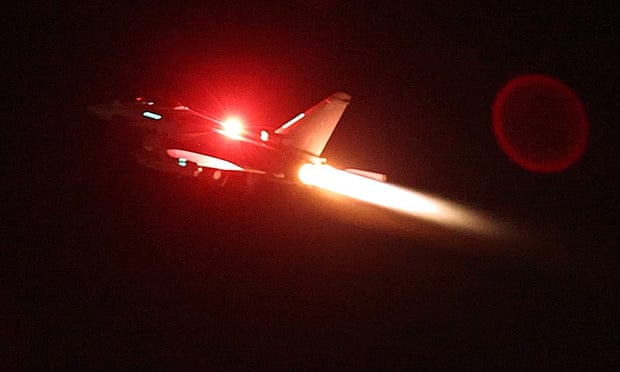By bombing Yemen, the west risks repeating its own mistakes
The Guardian
Instead of retaliating against the Houthi militia, the US and its allies should be pressing Israel to end its invasion of Gaza and accept a ceasefire.
(Text continues underneath the photo.)

A Typhoon takes off from RAF Akrotiri in Cyprus to to take part in airstrikes against military targets in Yemen. Photograph: Sgt Lee Goddard/MoD/AFP/Getty Images.
Early on Friday, the US and Britain launched military strikes against more than a dozen targets in Yemen controlled by the Houthi militia. (...)
Western leaders, and especially the US president, Joe Biden, insist that they want to reduce the risk of the war in Gaza spreading to other parts of the Middle East. But the US-led air and naval strikes on Yemen are the most significant expansion of the conflict since Israel launched its devastating assault on Gaza after the 7 October attacks by Hamas. Instead of avoiding a wider war, the US and its allies are escalating regional tensions and adding fuel to a conflict that has already spilled over to Lebanon, Syria, Iraq, Yemen and the Red Sea. The conflagration could spiral out of control, perhaps more by accident than design. (...)
Washington appears almost eager to repeat its mistakes: years of bombing by US allies during Yemen’s long civil war failed to dislodge the Houthis or persuade them to change course. In fact, the Houthis became stronger after each military confrontation.(...)
The US and its allies are resisting the clearest path for de-escalation across the region: putting pressure on Israel to end its invasion and accept a ceasefire.
A truce would remove the Houthis’ rationale for their aggression against commercial shipping in the Red Sea – and the movement’s leaders have said they will cease disrupting global trade once Israel stops bombing Gaza. The US-led military strikes are likely to have the opposite effect. (...)
The Houthis, who were losing support in Yemen before the Gaza war, have little incentive to change tactics since the conflict has increased their popularity throughout the Middle East. (...)
Washington’s unwavering support and billions of dollars in arms shipments to Israel are straining other US alliances in the region. It’s notable that two of the US’s closest allies in the Arab world, Saudi Arabia and the United Arab Emirates, have resisted joining an international naval coalition, assembled by the Biden administration last month, to confront the Houthis and protect shipping in the Red Sea. (...)
The Houthis essentially won the war, and they reached a UN-brokered ceasefire in 2022 with Saudi Arabia, although the two sides are still negotiating a permanent truce. (...)
For the US and Britain, that history should serve as a cautionary tale: the regional power they supported spent years trying to destroy the Houthis, only to be ground down and forced to negotiate a settlement.
Tags: #middle_east #israel #palestine #palestinians #gaza #lebanon #iraq #yemen #houthis #saudi_arabia #iran #hezbollah #hamas #red_sea
There are no comments yet.